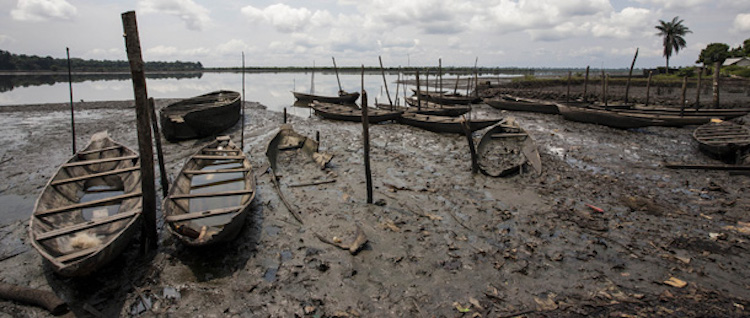By Lisa Vives, Global Information Network
NEW YORK (IDN) — There were high hopes for a one-billion-dollar clean-up of Nigeria’s most polluted region of Ogoniland in Nigeria’s Niger Delta region, the third largest mangrove ecosystem in the world when it got off the ground in 2019. It would address the greasy rainbow sheen over the 386-mile wetlands, the continual ooze from dormant wellheads and active pipelines, the once-lush mangroves coated in crude, and the smells of benzene while farmlands stood charred and barren.
Support from the UN Environment Programme (UNEP) and a funding pledge from the oil company Shell gave hope that some success would come from this most ambitious project.
But an expose in Bloomberg News called the project “far from being exemplary”. In fact, they say, “it is making one of the earth’s most polluted regions even dirtier”.
Friends of the Earth International (FoEI) shared their disappointment.
“We had hoped that the Ogoniland clean-up would set the standard for the clean-up in the Niger Delta as a whole,” said Mike Karikpo, an Ogoni attorney with the Friends of the Earth group. “But we’ve not seen any impact. There ought to be some impact on the lives and livelihoods of people whose lands and rivers were impacted by this oil.”
In a scathing review of the Ogoniland clean-up efforts, the UN body painted a picture of rampant mismanagement, incompetence, waste and lack of transparency. They highlighted the haphazard storage of oil-soaked soil that lets chemicals seep into uncontaminated grounds and creeks, the contracts awarded to firms with little environmental clean-up experience and proposals for millions of dollars in unneeded work.
“The oil companies should be responsible for cleaning up the environment,” said Daniel Leader, a partner at the UK law firm Leigh Day that represents an Ogoni community in an ongoing case against Shell. They “have essentially deflected their legal obligations and created this para-statal that has failed to deliver”.
Shell’s liabilities in the Niger Delta have been mounting—it paid $66.4 million to the Bodo community in 2015 and $109 million last year to compensate the Ejama-Ebubu community. The company’s efforts to sell onshore assets in the country have stalled pending a decision on $1.9 billion in compensation ordered by a Nigerian court in 2020 to pay to 88 plaintiffs.
Shell is the largest oil operator in Africa’s largest oil-producing region where residents face high poverty rates and a largely degraded environment, owing to hundreds of spills every year.
“We have groundwater polluted with benzene 900 times above the World Health Organization level, we have farmlands with poor yields, rivers that are barely fishable, neonatal deaths numbering thousands yearly as a result of spills,” Niger Delta activist Saatah Nubari told CNN.
Meanwhile, at least one Nigerian is forging ahead with a plan to grow and replant mangroves despite little or no support from the authorities.
From growing mangroves in her yard, Martha Agbani saw an opportunity to plant a nursery. By late 2019 she had 100 women mangrove planters.
The Niger Delta is home to one of the largest mangrove ecosystems in the world, one that humans lived in harmony with for centuries. They filter brackish waters, protect against coastal erosion and provide a sheltered breeding ground for aquatic life, which in turn sustains humans.
Like her mother, Ms Agbani worked for years for the Movement for the Survival of the Ogoni People, set up in 1990 in response to the environmental destruction of the ecologically delicate area by multinational oil companies.
And like her mother, she was inspired by the work of the activist Ken Saro-Wiwa, Ogoniland’s greatest hero executed by the Nigerian government under the military dictator Sani Abacha in 1995.
Mangroves protect marine habitats from harmful nutrients and runoff that can harm seagrass, coral reefs and fisheries. The roots help filter water coming off from the land, including pollutants, heavy metals, pesticides and agricultural runoff, another NOAA report found. Mangroves, therefore, maintain water quality and clarity. They also control nutrient distribution to seagrass beds and coral reefs. Without natural filters like mangroves, dangerous conditions like red tide and sargassum and algal blooms can proliferate.
Mangroves protect marine habitats from harmful nutrients and runoff that can harm seagrass, coral reefs and fisheries. Their roots help filter water coming off from the land, including pollutants, heavy metals, pesticides and agricultural runoff.
Without natural filters like mangroves, dangerous conditions like red tide and sargassum and algal blooms can proliferate. [IDN-InDepthNews – 05 September 2022]
Photo: Wooden fishing boats sinking into the oily mud in the Bodo City of Ogoniland in Nigeria’s Niger Delta region, the third largest mangrove ecosystem in the world. Credit: Friends of the Earth International


